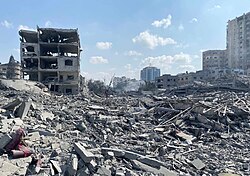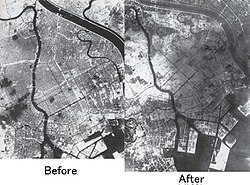Domicide (from Latin domus, meaning home or abode, and caedo, meaning deliberate killing, though used here metaphorically) is the deliberate destruction of housing by humans in pursuit of specified goals. [1] [2] It includes the widespread destruction of a living environment, forcing the incumbent humans to move elsewhere. [1] [3]
Contents
The concept of domicide originated in the 1970s, but only assumed its present meaning in 2022, after a report by the UN Special Rapporteur on the Right to Adequate Housing, Balakrishnan Rajagopal. [2] [4] [5] Rajagopal has argued that international law should be amended to consider domicide to be a war crime. [6]



